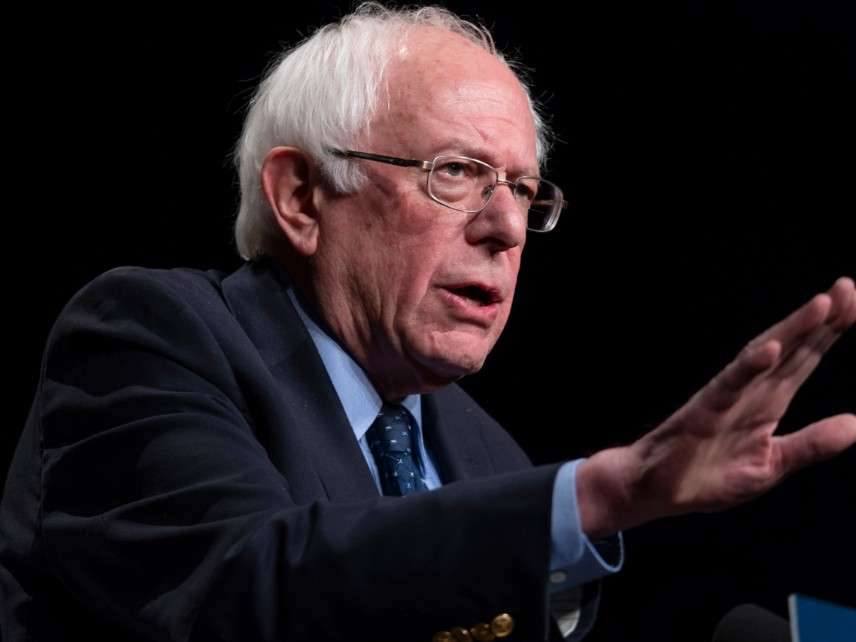Bernie Sanders and Elizabeth Warren Are Wrong About Trump's Medicare Cuts
Meanwhile, both support single-payer, which would radically cut payments to health care providers.
Over the last few days, both Sens. Bernie Sanders (I-Vt.) and Elizabeth Warren (D-Mass.)—both of whom are currently vying for the Democratic presidential nomination—have attacked President Trump for proposing Medicare cuts in his latest budget.
Trump's budget cuts $1.5 trillion from Medicaid, $845 billion from Medicare and $25 billion from Social Security.
Make no mistake about it: Trump's budget is a massive transfer of wealth from the working class to the wealthiest people and most profitable corporations in America.
— Bernie Sanders (@BernieSanders) March 11, 2019
The Trump administration wants to cut hundreds of billions of dollars from the #Medicare budget, all while giving billionaires and giant corporations huge tax breaks with the #GOPTaxScam. This is immoral. https://t.co/ESk4W672Wa
— Elizabeth Warren (@ewarren) March 12, 2019
You might get the impression from these tweets that Trump is proposing to slash Medicare's benefits. For the most part, that's not true. As Trump's acting budget director said when the budget plan was released, the president is "not cutting Medicare," and "there are no structural changes for Medicare." Too bad.

Instead, the cuts, such that they are, are focused on eliminating that conveniently vague Washington standby—"waste, fraud, and abuse." Trump's budget, like previous presidential budgets, won't become law, so this is in some sense an argument about vague cuts that almost certainly won't happen.
In this case, the proposed cuts mostly take the form of payment reductions to health providers, like hospitals. (In the world of health care policy, you can usually tell whose payments are on the chopping block by which industry group issues the loudest objection.) About 11 percent of the reductions would hit Medicare Part D, the prescription drug program, and could affect how much seniors pay out of pocket.
There are a few things to note about these reductions.
The first is that the total reduction is not the $845 billion Sanders claims. Instead, it's $515 billion. As the Committee for a Responsible Federal Budget (CRFB) noted in a recent analysis, the $845 billion figure includes money that is being moved out of Medicare and into other parts of the budget for the Department of Health and Human Services, which oversees Medicare. These aren't really cuts; they're organizational reclassifications.
The second is that these Medicare cuts are quite similar to the provider reimbursements backed by the Obama administration, which cut Medicare payments by about $800 billion as part of Obamacare. As an Axios report notes, President Obama defended those reductions by saying they wouldn't affect seniors' benefits. According to the CRFB analysis, many of the cuts included in Trump's budget "closely resemble or build upon proposals made in President Obama's budgets."
At the time, Republicans criticized those payment reductions, implying they would hurt seniors. In reality, the main effect would be to make obvious hypocrites out of everyone involved. Obama responded to GOP criticism by portraying those payment reductions as necessary to "strengthen and preserve" Medicare. If that's what Obama was doing then, then that's what Trump is doing now.
Perhaps Sanders and Warren believe that reimbursement cuts would force providers to reduce service: Pay doctors less, and you'll get less from them.
If so, it's worth recalling that both are backers of Medicare for All—single-payer plans that would scrap today's private health insurance coverage as well as today's Medicare program for seniors and replace them with a new, government-run program covering all Americans. Sanders' single-payer plan is premised on paying health care providers far less than they are paid right now, with some estimates putting the reduction around 11 to 13 percent, and others putting it closer to 40 percent. In any case, doctors and other health care providers would, overall, be paid quite a bit less than they are today.
The transition to single-payer would be fairly rapid, with the Sanders plan calling for full-scale implementation in just four years, and another plan recently introduced by House Democrats calling for a two-year timeline, meaning doctors would face a sudden payment cliff.
There is a reasonable debate to be had about exactly how provider rates affect service, and what sort of payment reductions and reimbursement tweaks doctors and hospitals can absorb. Americans tend to pay higher prices for health care services than in other countries, and health care workers at all stations are often paid more as well. Trump's budget would cut existing Medicare rates; single payer would reduce payments from today's mix of private and public payers. Too much of the health care industry lacks any meaningful price signals, and even payers and providers themselves don't always fully understand the various reimbursement systems they interact with. It's complicated.
But it is hard to imagine that a rapid transition to a nationwide government-run system of health care financing that dramatically reduces provider payments would not significantly impact the quality or quantity of health care delivery in the United States. Yet by supporting Medicare for All, that is what Sanders and Warren are saying they want for every American.


Show Comments (45)